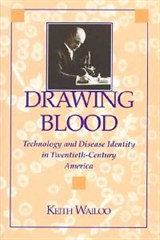Drawing Blood
"Boldly and skillfully... analyzes not only the role of physicians but of research hospitals and pharmaceutical companies... shows how race, gender, and lifestyle influence how physicians defined and responded to the very diseases that were called into existence by the new technologies they employed... a major contribution to the social history of medicine." James H. Jones, American Historical Review
"First class history at many levels.. can be read with profit and pleasure by the clinician, historian, non-medical scientist, and interested layperson." John Truman, M.D., Science
Drawing Blood: Technology and Disease Identity in Twentieth-Century America (Johns Hopkins University Press, 1997)
In Drawing Blood, medical historian Keith Wailoo uses the story of blood diseases to explain how physicians in this century wielded medical technology to define disease, carve out medical specialties, and shape political agendas. As Wailoo's account makes clear, the seemingly straightforward process of identifying disease is invariably influenced by personal, professional, and social factors—and as a result produces not only clarity and precision but also bias and outright error.
Drawing Blood reveals the ways in which physicians and patients as well as the diseases themselves are simultaneously shaping and being shaped by technology, medical professionalization, and society at large. This thought-provoking cultural history of disease, medicine, and technology offers an important perspective for current discussions of HIV and AIDS, genetic blood testing, prostate-specific antigen, and other important issues in an age of technological medicine.
